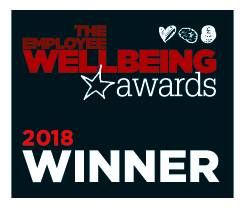Anglian Water's CEO says wellbeing is central to business

As a CEO what is your primary reason for addressing employee wellbeing at your organisation?
There are two aspects to addressing employee wellbeing at Anglian Water. One is that most of our employees are with us for a long time, most of their working lives. So there is a moral imperative to look after them.
From a business point of view, it is pretty clear cut to me: we get fitter, happier, healthier employees who are more productive, deliver a better service, and who can make better decisions in terms of risk. It is a sensible area for any business to focus on.
How committed is your board to the issue of employee wellbeing?
We’ve picked up wellbeing as a strategic boardroom issue for many years. We use the Workwell model developed by
Business in the Community (BITC), which requires wellbeing to be treated as a strategic boardroom issue. So it sits at the centre of our plans and is often referenced in our annual report and accounts. It is integral to everything we talk about.
Do you report on employee wellbeing to shareholders?
We report at different levels. Within the business we track a whole series of metrics that are picked up through the BITC Workwell model. We also use BITC’s Workwell benchmark questionnaire to gauge how we are making progress.
Additionally, our annual report and accounts reports on issues such as absence and includes a narrative that describes activities such as mental health wellbeing campaigns or financial wellbeing campaigns and why we run them.
What are the business or workforce challenges that keep wellbeing a main focus at your organisation?
Ours is a regulated utility operating in an increasingly volatile and complex environment. Becoming more efficient is a key aim for us because ultimately that is what keeps customers’ bills down.
We also have to continuously improve our service amid competition from the likes of Amazon or Google, and technology is changing the nature of our jobs.
We are very open with employees about the fact that the changing environment is very much the norm now.
And we are working with leaders and managers to help them recognise the critical role they have in helping teams cope with these ever changing conditions.
For example, we placed 1,000 leaders on a programme focused on improving the resilience of the business by
improving the resilience of employees. So we are teaching them about how to cope with change.
That encompasses a whole series of interventions from opening their minds to new ideas, encouraging healthier practices such as more exercise, or taking time out. We work with Loughborough University and consultancy Lane4 on this.
Sports psychology has been incredibly helpful in equipping our leaders to take people through a really difficult period of change.
Do you require organisations in your supply or distribution chains to commit to any employee wellbeing standards before signing contracts with them?
We have what we call alliances. We work very closely with our big Tier One partners, the likes of Skanska,
Barhale, Balfour Beatty and Kier Group. All the chief executives sit on a group that meets quarterly and
agrees certain targets, one of which is around the employee wellbeing agenda.
We have programmes in place across these organisations that address areas such as being happy, healthy and safe.
But it’s not just these big Tier One partners we are working with on wellbeing, it’s also Tier Two and Tier Three partners.
We hold seminars with SMEs to bring them along the journey. We prefer that approach to just prescribing
everything in a contract, which can just encourage box ticking. We believe there is a strong business case and want MDs of smaller companies to come on board with it. Frankly, most do.
Does your board report on mental health at your organisation?
We haven’t included information on mental wellbeing in our annual report as yet but we do track it. It’s possible we will this year.
Do you feel the government supports employers to improve employee health and wellbeing?
I am reluctant to always point things back to government. I’m much more inclined to ask, what can we do as businesses to address a particular issue? But what works well is when government itself aligns with business.
BITC has carried out a lot of work with Public Health England to produce joint toolkits in areas such as mental health. They have just launched one on sleep and there are more coming out on alcohol, drugs and tobacco.
These are important because messages are aligned between business and health experts and information isn’t conflicting. I think collaboration is really key.
Peter Simpson, CEO of Anglian Water won the inaugural REBA Employee Wellbeing Visionary Award 2018
View his interview video







